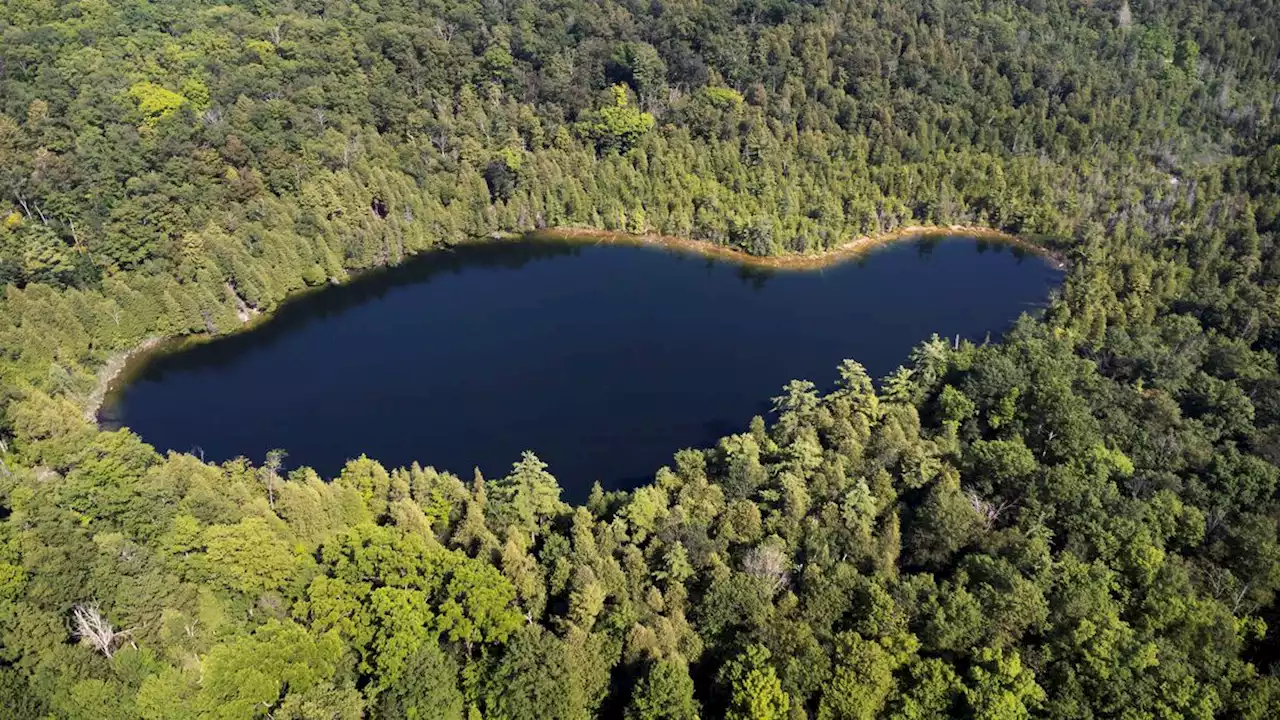A small lake near Toronto is on the verge of becoming the representative site of humanity’s impact on the planet across geologic time.
On Tuesday, an international panel of scientists announced that Crawford Lake, a small body of water located 50 kilometres west of Toronto, has emerged from among a dozen candidates around the world as the place that best records the dawn of the human epoch.
Dr. McCarthy, who has long championed the selection of the Canadian site, added that it is ideally positioned to reflect the moment when the planet swerved as a consequence of human influence along with all the consequences that implies. That the place has turned out to be Crawford Lake is a coup for Dr. McCarthy and her colleagues at several Canadian institutions. For the past five years they have been on a quest to document the lake and make the case for its selection as the archetypal site that defines the Anthropocene.
This is important, says Alwynne Beaudoin, president of the Geological Association of Canada, who was not involved with the Crawford Lake effort, because the Anthropocene requires a precise definition if it is to become an accepted part of the scientific lexicon. After all, experts already debate whether the Holocene, the 12,000 year stretch that has elapsed since the end of the last Ice Age, is itself long enough to be considered a separate epoch form the 2.57 million year old Pleistocene that preceded it. In comparison, debating whether an interval that is shorter than some people have been alive seems to test the limits of what is meant by a geological timescale.
Known as “the great acceleration”, this moment in time also left an unmistakable calling card in the form of plutonium isotopes, created during nuclear weapons testing, that were lofted into the stratosphere and distributed simultaneously around the globe. “The fact of the matter is if you want to be part of the geological timescale, you must have a site – something you can touch – to be the definition of that series in the [chronological] record,” she said.
A few centuries more and those Europeans were now busy settling by the lake, clearing the land and planting crops. Small towns grew along the rail line that passed nearby. In 1883, George Crawford bought the lake and established a sawmill there. By then the varves had reappeared, the chemistry of the lake now permanently altered by all the surrounding activity.
Canada Latest News, Canada Headlines
Similar News:You can also read news stories similar to this one that we have collected from other news sources.
 'Radical Love': Toronto hospice takes new approach to help Toronto's homelessTORONTO — A last\u002Dminute assist has sent Kevin Ackroyd’s life into overtime.
'Radical Love': Toronto hospice takes new approach to help Toronto's homelessTORONTO — A last\u002Dminute assist has sent Kevin Ackroyd’s life into overtime.
Read more »
 Five things to watch for in the Canadian business world in the coming weekTORONTO — Five things to watch for in the Canadian business world in the coming week:
Five things to watch for in the Canadian business world in the coming weekTORONTO — Five things to watch for in the Canadian business world in the coming week:
Read more »
 Corporate ethics czar starting human-rights probes around Canadian imports from China | National NewswatchNational Newswatch: Canada's most comprehensive site for political news and views. Make it a daily habit.
Corporate ethics czar starting human-rights probes around Canadian imports from China | National NewswatchNational Newswatch: Canada's most comprehensive site for political news and views. Make it a daily habit.
Read more »
 Federal corporate-ethics watchdog to begin human-rights probes around Canadian imports from ChinaSheri Meyerhoffer will announce investigations into ‘the supply chains and operations of two Canadian companies’ in China based on an ‘initial assessment of allegations of human rights abuses’
Federal corporate-ethics watchdog to begin human-rights probes around Canadian imports from ChinaSheri Meyerhoffer will announce investigations into ‘the supply chains and operations of two Canadian companies’ in China based on an ‘initial assessment of allegations of human rights abuses’
Read more »
 Corporate watchdog to start human rights probes of Canadian imports from China - National | Globalnews.caOttawa's corporate-ethics watchdog is set to announce multiple investigations into whether Canadian companies are importing products made through human-rights abuses in China.
Corporate watchdog to start human rights probes of Canadian imports from China - National | Globalnews.caOttawa's corporate-ethics watchdog is set to announce multiple investigations into whether Canadian companies are importing products made through human-rights abuses in China.
Read more »
 Corporate ethics czar starting human-rights probes around Canadian imports from ChinaThe Liberals appointed Sheri Meyerhoffer as the first Canadian Ombudsperson for Responsible Enterprise in April 2019, and advocates and MPs have since criticized the government for not launching a single investigation
Corporate ethics czar starting human-rights probes around Canadian imports from ChinaThe Liberals appointed Sheri Meyerhoffer as the first Canadian Ombudsperson for Responsible Enterprise in April 2019, and advocates and MPs have since criticized the government for not launching a single investigation
Read more »
